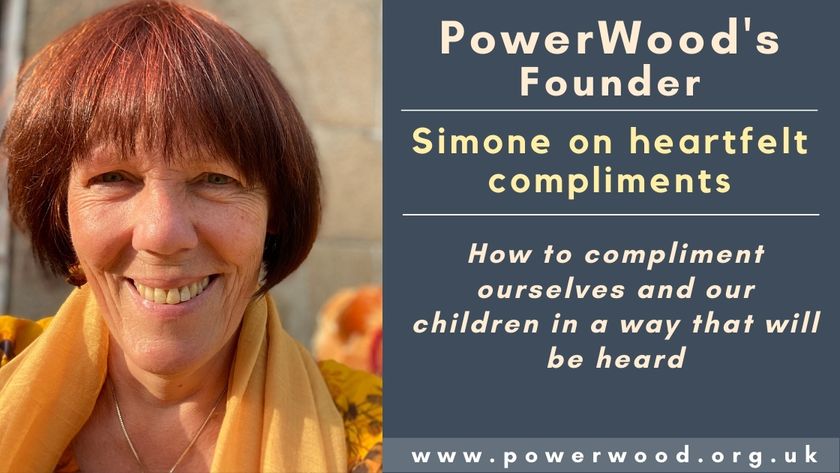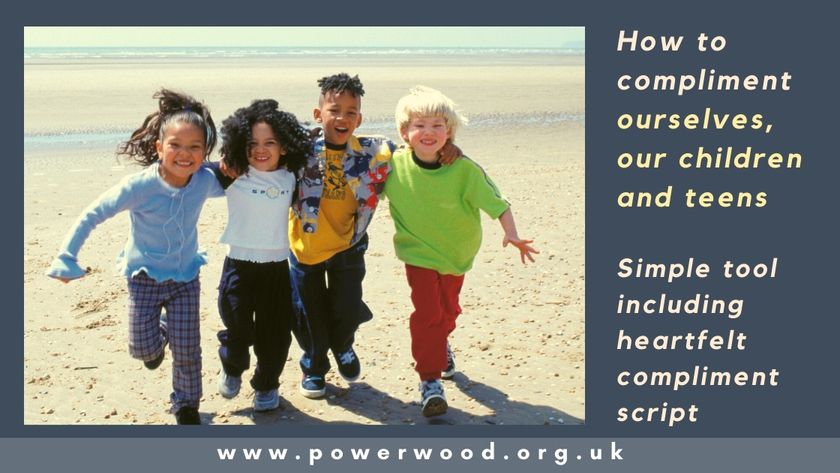
This post includes a ‘heartfelt compliment script’, a tool to compliment ourselves and our child effectively and is part of the Multifaceted Emotion Regulation Theory (MERT) developed by Simone de Hoogh.
“Every challenge is an opportunity to compliment our child with a heartfelt compliment.” Simone
First – ourselves
Although it is counterintuitive, to be able to compliment someone authentically we need to be in a good place ourselves – and in order to do that we first have to learn to meaningfully praise ourselves for our efforts and our determination to build our own baseline, which is the energy level and emotional resilience we have.
If we have emotional overexcitability (OE) we will have a tendency to focus on others when we are overwhelmed. People with OE tend to be highly sensitive to other people’s needs and emotions, but less so to themselves. This presents a problem if we are trying to compliment ourselves or offer ourselves self compassion, as this can make people with OE feel uncomfortable.
This uncomfortable feeling might stem from a childhood dynamic where we were used to overstepping our boundaries and ignoring our own needs in order to give ourselves the best possible start in life.
If this is the case we might want to explore this in more detail. The PowerBook is an ideal way to do this. Simply put, the PowerBook is a tool that helps us give ourselves, and by extension our children, emotional credit. It is something we can use to practise complimenting ourselves, and if and when we don’t manage to practise compassion, explaining to ourselves where our resistance comes from. Read more about befriending the PowerWood.
The content of our compliments
We have a tendency to give compliments about talents, looks and achievements, but these can make people insecure because we have limited influence over our talents and looks, and we never know how much of an achievement is down to us or whether we just got lucky! Often those compliments trigger in us or our children all kinds of not helpful thoughts and feelings that might end us or them up in the cycle of emotional and sensory overload.
Compliments that make us feel really appreciated are those that relate to what we feel we are in charge of – e.g. our courage, perseverance and/or our effort (process-related, obstacles conquering) – and that show that we are seen as the unique people we are.
“When our daughter, 16 at the time, finished her first year of university with great results, everybody was complimenting her results and she became very grumpy (as she hadn’t done much at all) because she felt a fraud. I said “Well done YOU, that despite your boredom, you kept going and had the determination to continue jumping through all the necessary boring administrative hoops of reading chapters and writing essays and being on time for all your uni obligations.” and she felt relieved to get a compliment that a) she deserved, and b) gave her the feeling I, her mum, really saw and appreciated her.” Simone
Value perseverance and determination
Bright children can have a tendency to not go the extra mile because they often manage to avoid the need by achieving an average level, which is not challenging for them. Learning something outside of their comfort zone helps with developing perseverance and determination. It can be something physical e.g. learning to play a musical instrument for logical thinkers (they normally love the beauty of music theory), or learning a language. Many are top-down learners, needing a total concept on which they can hang all new information, for example, if they learn about how to make divisions, they need first to see the whole picture around maths, how it is using a kind of code that is understandable for everyone over the world independent of the language they are talking, from the history of maths towards the current value of maths in and how it is used in society, so they can see what gaps they have in their information. Creating this tree of knowledge helps them to develop their own way of structuring new information (building a knowledge tree to organise information is a very important executive functioning skill to acquire) so they can easily access in their brain the new knowledge.
Giving heartfelt compliments
We give compliments to our children or ourselves about what we or our children can be in charge of. That can include awareness – as painful as it sometimes might be –, our effort, dedication, perseverance etc., all focused on the process instead of the outcome. We try to avoid complimenting ability, talent or looks – or achievement or outcomes, as these might have been luck.
We compliment as specifically and detailed as we can the action and relate it to ourselves or our child, we never generalise.
We do it authentically, not too much, and we are realistic instead of praising for the sake of praising.
Always ask ourselves or our child “how did I/you manage?” raising awareness of any strategies used so it’s easier to implement it in the next situation.
Complimenting our children
Heartfelt compliments are always very specific and have to resonate with our children in order for them to accept and believe them. In this way, our compliments show that we really see the effort the child has put into a situation or with meeting a challenge to help themselves to move forward.
Tapestry of life
Unfortunately, we often think about children in generalised terms, e.g. our child is aggressive, or our child is easily upset, our child is rude. This way of looking at our children is narrowing our own perspective on our child, as we mostly see what stands out to us and not the total picture of the child.
From an evolutionary perspective, humans developed a bias towards the negative. In the past it was vital to remember which bush had poisonous berries, or interpret the rustling grass as a tiger instead of a pleasant breeze. It is therefore very understandable that we have a tendency to form generalised negative views. However, when it comes to our children, this can get in the way of us being able to support them.
Therefore, we have to look at our generalised terms.
“Sophie is so over the top, I can never say anything without getting an over-emotional reaction. Last Friday, we went into a charity shop and she saw something she liked and wanted me to buy it and I had to say no, and she completely lost it, crying and wailing on the floor, very embarrassing.” Mum of two
So, first of all, whenever Sophie calms down it is worth a compliment.
Secondly, we the parents learn to look closely at the tapestry of Sophie’s life. It may look solely as though it is covered with over-emotional reactions, but we will find she is not always reacting so emotionally. Sophie sometimes can stay calm when she gets a no, for example when a younger sibling took her teddy bear, and she wanted to take it back and mum suggested letting her sibling have it for a while and she just accepted. Great moment for the mum to compliment Sophie with staying calm.
Playing the detective
We also have to play the detective, is there a difference between the moments Sophie can and can’t take a no, and try those out and see if it makes any difference.
For example, the mum of Sophie wondered if the word ‘no’ was triggering to Sophie, and tried to not use the word ‘no’, which brought the number of emotional meltdowns down, mum also noted that going out would increase the chance for a meltdown, partly because this was the very thing mum feared because of the embarrassment. Trying to avoid a meltdown meant mum was being unclear about what was and wasn’t possible and possibly falling into a stress response, which put Sophie more on edge. Sophie was also more prone to being triggered by being told ‘no’ on the days she hadn’t slept well, so the mum was able to adjust her schedule on those days and would, for instance, opt to do something like go into nature when Sophie hadn’t slept well, which also helped.
Change focus from what doesn’t go well to what does
For instance, when our child who normally gets upset when the younger sibling becomes physical doesn’t respond with violence. “That was really well done that you stayed so calm, well done YOU!”
Or when we have lost it and started raising our voice or shouted, we can say: “I really appreciate that when I was shouting, you moved yourself away from the situation and went to your room” or “That was really helpful reminding me to stay calm (if it was helpful) when I got upset, thank you for that” and always ask “How did you manage” and if necessary make them aware by naming the moment they changed their mindset from overwhelmed to calm the ‘just doing it’ strategy, allowing them to be aware of the moment they made this empowering transition emotionally, enabling them to repeat this in future.
A heartfelt compliment is supporting our child in several ways. Besides making them aware of ‘just doing it’ as the most practical strategy, it also helps them to focus on the process of emotion regulation.
Focus on what helps
Although we are evolutionarily defined to focus on the negative, forget about the moments our child erupted, instead focus on the moments they didn’t get triggered and managed to contain their emotions and compliment them about it so they are helped to see what they did well in a situation. What we focus on will get repeated.

Strengthening their emotional resilience.
Research by Gottman and The Magic Relationship Ratio, According to Science shows that five positive compliments makes it possible for anyone to listen to one remark that they could take as a criticism as just an expression of someone else’s feeling and not take it personally. It’s the difference between feeling triggered into negative feelings about self and/or others or being able to see that whatever someone expresses says more about themselves than about us. So by giving heartfelt compliments we can build ‘emotional credit’ for our children and enhance their emotional resilience.
The heartfelt compliment
Imagine our child for whatever reason had a huge meltdown. Finally, after lots of screaming and throwing things around, our child has calmed down and is now playing with Lego.
Yay! This is the moment to throw in a compliment, prepare first…
How to prep ourselves
Before giving a heartfelt compliment please use the 4-7-8 breathing tool to prevent bringing any emotional tension to the conversation.
Secondly, we make sure that we speak the words casually, void of any emotion to prevent retriggering our child.
Is it the right time or postpone
And most importantly we ask ourselves is this the right time for ourselves and/or for your child. Do we have the energy and emotional resilience to stay calm whatever the reaction?
If after the 4-7-8 breathing tool we feel we are not able to be calm, we postpone our compliment until the next day or next week. There is never a hurry to compliment your child. You can say next week in passing by “last Tuesday (be as vague as you can, no use to trigger our child with a description) you managed to stay calm when your brother took your favourite car, well done YOU! How did you manage?
Or if you know that your child is tired, irritable, hungry etc and there is a good chance they will be retriggered at this moment easily, postpone until you feel confident the circumstances are good.
“Our children will not react to our words if we feel overwhelmed, they will react to what we are feeling.” Simone
The heartfelt compliment script
After the preparations are done and we notice that our child has calmed themselves we can casually say something in passing like:
“Well done YOU for calming down – add ‘this morning’ if it is later – (be as vague as you can to prevent retriggering the feelings around the event and don’t wait even a millisecond for a reaction), how did you manage?” filled with admiration.
Our child will probably respond with an indifferent shrug, and say something like “I don’t know, I just did it” or if they are a teen they might respond with an irritated voice “How would I know?!?!” They normally get irritated and we respond with “So you just did it! That strategy really worked, well done YOU” we respond with an enthusiastic voice, while walking off, making them aware that ‘just doing it’ is the most used but unknown strategy in the aware toolbox of young ones so they can consciously apply them in future situations.
Value of compliments
Complimenting our children will strengthen their emotional resilience, it will raise awareness about the tools and strategies available to overcome obstacles on their path and help them to develop a growth mindset, a concept developed by Carol Dweck. This in turn will help them dare to take risks and see mistakes as a tool for growth, and will inevitably grow their confidence in their own ability to sort things.
And on that note, well done YOU for being open to looking at how complimenting yourself and your child can be improved. I hope you appreciate yourself for that.
Simone
© 2022 Simone de Hoogh, senior coach and educational and parenting consultant, and founder of PowerWood. All posts by Simone de Hoogh
Help us to continue support to all neurodiverse families and individuals
PowerWood offers to neurodiverse families understanding, simple tools and strategies that enable us to support ourselves and our children through emotional overwhelm. If you enjoy reading the articles please support PowerWood making all information available to all by becoming a PowerWood Community FreeBee or Friend member. Thank YOU!

